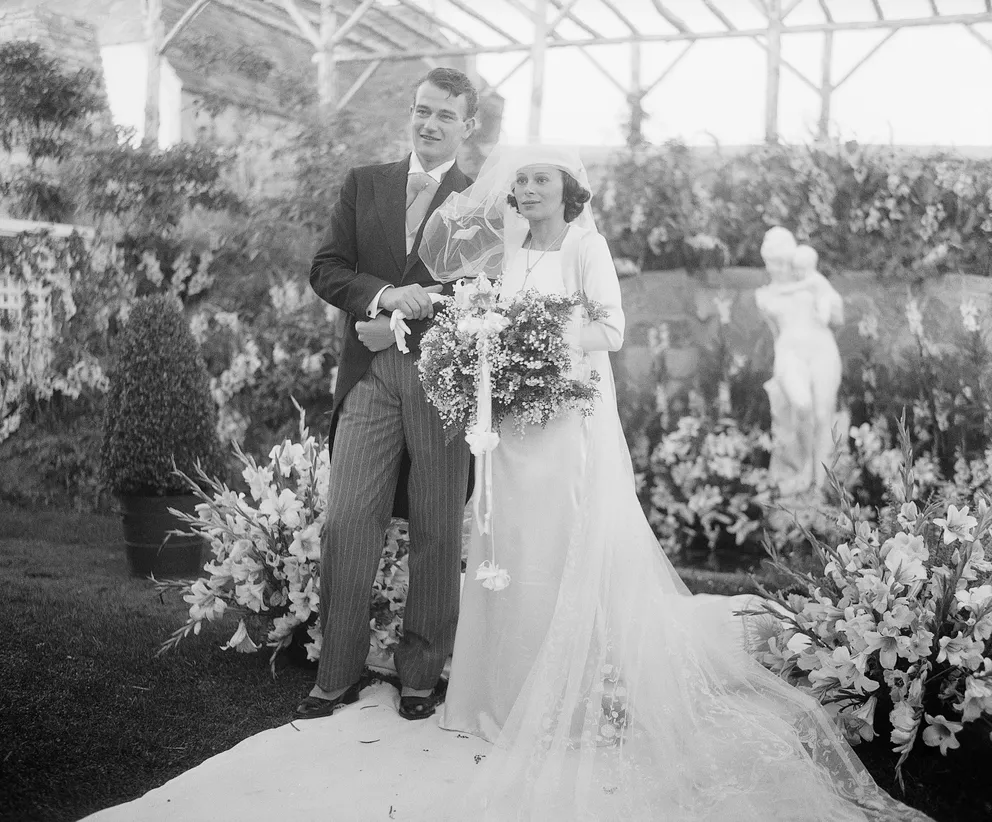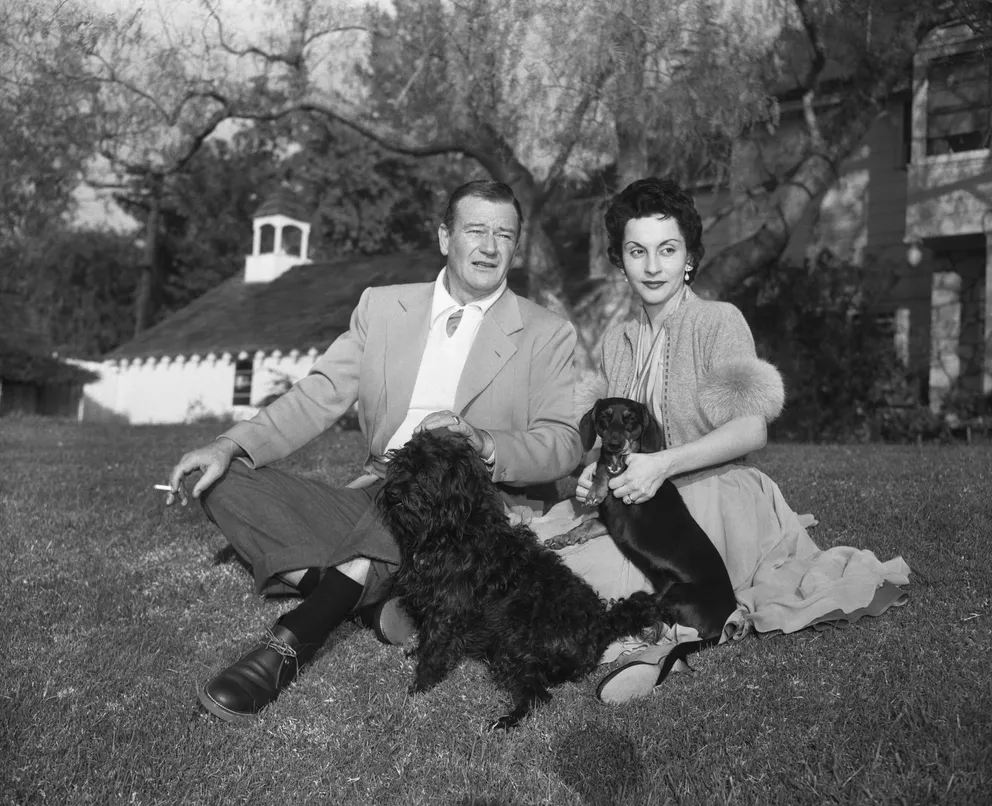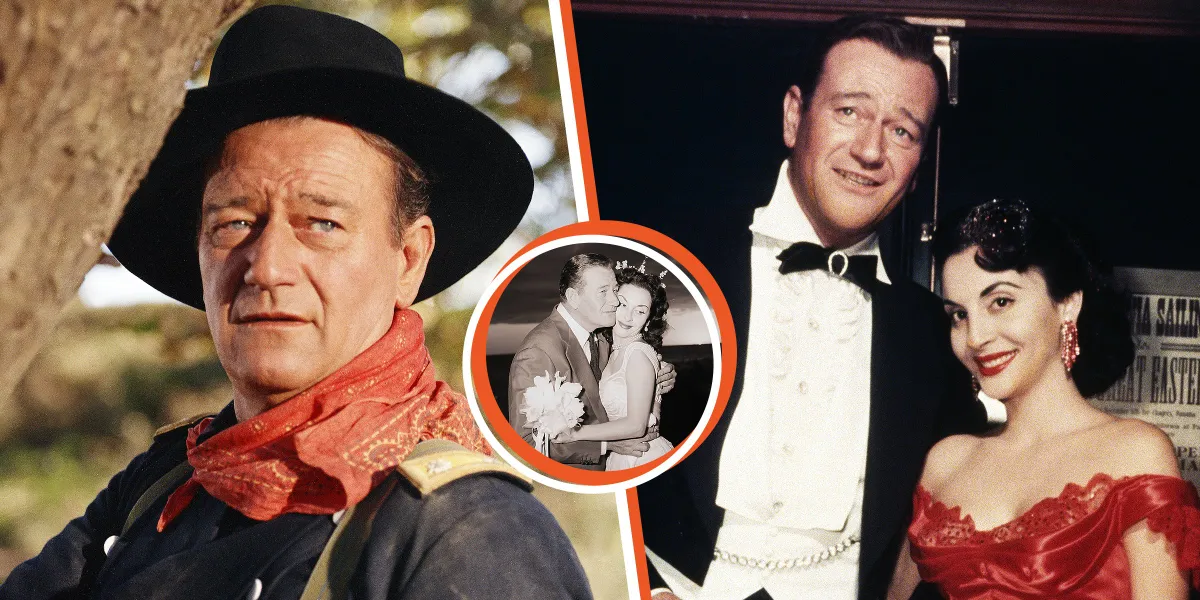John Wayne was America’s favorite cowboy. Tough, rugged, and handsome, he often portrayed a shy man with his love interests on the screens. However, his off-screen persona was something different. Despite being married, he had numerous dalliances.
He married his first wife, Josephine Saenz, in 1933, and they had four children, Melinda, Patrick, Toni, and Michael. However, the union would last only a decade, ending in 1943.
Reports say the union ended due to Wayne’s affair with Marlene Dietrich after he starred in “Seven Sinners” in 1940 and “The Spoilers” in 1942. Many biographers blame Dietrich for the fling, saying she seduced Wayne. The affair lasted three years until Wayne married his second wife.
The “Men Without Women” actor married his second wife, Esperanza “Chata” Baur Diaz, in 1946. Like his first, his second marriage was riddled with his open affair with actress Gail Russell, jealousy, and drunken fights. They lasted eight years before divorcing in 1954.
The day his divorce from Diaz became final, he married his third wife, actress Pilar Palette and had three more children with him — Aissa, John, and Marisa.
Wayne’s legacy lives on through his children, who have defended his name after people posthumously accused him of racism in the past years. In 2019, a 1971 interview of Wayne in Playboy resurfaced where he said he felt no remorse for the subjugation of Native Americans.
Grunge reports that Wayne was, by his admission, a white supremacist. While some thought the interview racist, others, such as his daughters, felt people had gravely misunderstood the actor.
After the interview resurfaced, his daughters rushed to his rescue in a bit to defend their father’s legacy. Marisa Wayne, from his third marriage to Pilar, told Closer Weekly, as Fox News reports:

“He had an ability to see both sides of the story.”
Aissa, his other daughter, also defended her dad, saying he loved people and was a people person. “He cared about his fellow human beings,” she said. “I think that really was a big feature about him.”
Contrary to what many believed, Wayne was a doting father to his children. Aissa recalls her childhood, mainly spent on the Wayne property, which covered five and a half acres on a large hill deep in the San Fernando Valley.
She remembers how she would feel a warm surge of energy, significant presence, and love engulf their house whenever Wayne came home from filming or working on whatever projects.
Her lasting memories of her dad were of him coming home from work and hugging her intensely, then hurling her into the air, almost as high as the crystal chandelier. They would then laugh as she fell into her dad’s embrace.
Wayne was not all about play, though. He also passed along essential life lessons to his daughters, one being the importance of always speaking the truth. Marisa recalls one incident in Nairobi, Kenya, where they had a house.
She says she and another girl were playing when Marisa felt her friend was being a bother and kicked her in the head. The friend ran to the adults and ratted Marisa out. When Wayne came over, he asked Marisa if she did kick her friend.
He told her that if she lied, she would be toast. Marisa decided she would tell her dad the truth, and when she did, her father said he would not punish her. Why? Because she had spoken the truth.
She also retold how one time they were staying on a golf course resort when her dad asked her to join him. She’d never played before, but she gladly went with him. However, all her attempts to hit the golf ball with the club proved futile.
Her father came to her rescue and stood behind her directing her on how to play. When she finally swung her club, she could not see the ball in front of her but was sure she had hit something. She looked back and saw her dad staggering before falling to the ground. She had hit him in the face.
Marisa was scared! She thought she would be in trouble once her dad gained consciousness. When he finally did, he could see how frightened she was and comforted her, saying:
“Honey, you know everything is ok. I’m ok. I’m gonna be fine.”

Later, he took polaroid photos of her holding the golf club and wrote on them, “Who hit John?” He joked about the whole situation and put his daughter at ease.
Marisa holds all beautiful memories of her father and remembers him as a man who loved people and strived to give his children a reasonably normal childhood. He was a humble man who made everyone feel special.
WAYNE’S DARK SIDE
Wayne’s daughters adored him just as much as his fans. And while they hold beautiful memories of the star, his daughter Aissa also admits that he had a dark side that many did not get to see.
In her book “John Wayne, My Father,” she disclosed that her father’s drive came from insecurity and complexity, and he wasn’t as straightforward as his film characters would suggest.
She recalls one time when her father was at the peak of his career, and actor Marlon Brando, gorgeous, arrogant, and sizzling with success, started eyeing her mother. He sent word to Wayne, asking if he could have an evening with his wife.
Wayne curtly replied, “No!” and that evening, when he went home, he went into a frenzy, exploding into a fit of jealousy. That was the first time his wife saw his “dark side.” Aissa wrote:
“It was my mom’s first glimpse of his dark side. She realized, only then, that my father was not the character he played on the screen. Men who not only had self-assurance, they reeked of it.”

That was, however, only part of the challenges Pilar would face in her marriage to Wayne. According to Aissa’s book, she also struggled with drug addiction, fuelled by her duty toward her husband.
She often found herself torn between balancing motherhood and marriage. On the one hand, she had to support her globe-trotting superstar husband and, on the other, raise her kids, which left her stressed and drained.
To help her deal with the lack of sleep and depression and mask her insecurities — she had little formal education and secretly felt inadequate around her husband’s famous friends — she depended more on pills.
Pilar remained married to Wayne until he died, but she moved out of their shared home six years earlier. For years, people always approached her, asking her to write a book about her marriage to Wayne, but she declined.
Eventually, when biographers started writing stories about her husband that were anything but true, she decided she would write a book if only “to protect his image and to do it for [her] kids, so they know the real story.”
She says that Wayne was no crybaby and could tolerate pain and things like that. She remembers him as a quiet guy and adds, ” I really miss him. I wish he was back here again.”
